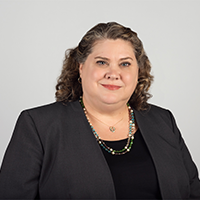
Tips from the Bar: Jodi Cleesattle

Jodi Cleesattle “accidentally” fell into the practice of law, but now she can’t picture herself doing anything else. After working as a political news reporter post-college, Cleesattle attended law school in the early 1990’s with the goal of pursuing a career in political or legal news. During her time at Washington College of Law in D.C., Cleesattle co-founded The National Jurist, a national magazine for law students that still thrives today with an estimated reach of 100,000 law students and educators. Passionate about media and First Amendment issues, Cleesattle also founded her law school’s Burton D. Wechsler National First Amendment Moot Court Competition, which the school continues to host annually.
After graduating law school and clerking for a year, Cleesattle joined a D.C.-based law firm where she practiced media and First Amendment law alongside other civil matters. She moved to San Diego in 2002 and worked for a few years as a partner in the firm’s San Diego office. However, the firm’s media law practice was dwindling, and Cleesattle realized that after 12 years at the firm, it was time for a career change.

She made a hand-written list of “Things I Could Do” to chart out her options, which led her to a position as deputy attorney general at the California Department of Justice. Now at 15 years at the Attorney General’s Office, Cleesattle is grateful that she had the courage to make this career change earlier in her career.
“Too many attorneys stay in jobs for too long that burn them out,” she said. “Attorneys who know they are unhappy don’t always explore other options because there’s a mentality that any other job would be the same, and that simply isn’t true. There are other jobs that could make you at least as happy, and it’s just a matter of figuring out what they are. You should always do your best work and gain good experience wherever you are working. But you should also realistically evaluate whether you are happy doing what you’re doing, and if it’s not a good fit long-term, there are other options out there.”
As Supervising Deputy Attorney General in the Employment & Administrative Mandate Section, Cleesattle defends state agencies against employment claims like discrimination, harassment, and disability accommodation and supervises a team of litigators.
Having worked in private practice and at a public agency, Cleesattle notes that government agencies tend to offer new attorneys more hands-on litigation experience. Law firms also have their own unique advantages, such as niche practice areas and often better pay. For students and lawyers seeking a new role in either sector, it is important to research the potential employer, talk to people who work there if possible, and ask the right questions to understand the firm’s practice areas and work culture.
Across most settings, new attorneys work under the supervision of more experienced lawyers. Cleesattle encourages junior attorneys to communicate openly with their supervisors to discuss strategy and coordinate deadlines so that everyone’s needs are met. Junior attorneys should also feel comfortable offering their own ideas and suggestions in the context of a respectful and collaborative dialogue.
“The most important thing is communication, and that includes when it’s hardest to communicate,” Cleesattle emphasized. “When you’re struggling or you have questions, you need to reach out then. All of us sometimes need help — something goes awry, projects stack up. In litigation especially, things can come crashing in your door and you need to react to them. Being open and communicative with the rest of your team is the best way to ensure that you as a team handle work efficiently.”
She also offers tips on brief and motion writing. Strive to tell a straightforward story that includes all of the essential elements without getting bogged down in legalese, jargon, or extraneous details. Focus on the most important facts first and present the arguments in a logical order. Create an argument outline to ensure you understand the arguments you are making and the order in which you plan to make them. Where appropriate, address policy arguments to show the Court why the outcome you seek would advance desirable policy objectives.
“Ultimately, you want to tell a dynamic, straightforward story and make it easy for the judge to agree with you,” Cleesattle said.
Within her busy schedule, Cleesattle impressively finds time to give back. She proudly serves as president of the Juvenile Court Book Club, a nonprofit that facilitates book discussions and academic tutoring for girls and boys incarcerated in San Diego juvenile facilities. She is currently serving a temporary term on the SDCBA Board of Directors and previously served as an SDCBA director from 2015-2017. She is also on the boards for California Women Lawyers and the Tom Homann LQBTQ+ Law Association. Last year, the California Lawyers Association honored her with its annual Ronald M. George Public Lawyer of the Year award in recognition of her public service through the Attorney General’s Office and her other community efforts.
“I’ve grown up believing that you try to help others whenever you can,” Cleesattle said. She is inspired by her father who always did what he could to help others despite the family’s financial struggles. Losing her mom in a car accident at age 6 made her even more appreciative of her dad’s sacrifices and taught her to value the important things in life.
“People need each other,” she said. “When I first moved to San Diego and didn’t know a lot of people, I started meeting people through Lawyers Club. San Diego has a great network of lawyers who are friendly, civic-minded, and active in community service. There are many affinity bar organizations here with a mission of lifting up groups that have had a hard time getting ahead in the law. I love that kind of spirit. Wherever I can, I want to make our community a better place.”